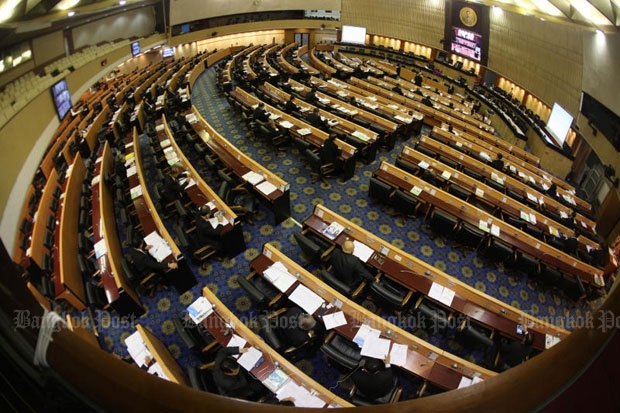
The National Legislative Assembly on Friday unanimously approved amendments to the Computer Crime Act (CCA) that critics say will make it even more draconian than before.
The junta's hand-picked lawmakers, the majority of them military and police officers, voted 168-0 with five abstentions for changes that could give authorities unchallenged authority to police the web and suppress criticism.
The amendments do address one major complaint of rights advocates, in that they remove a provision covering defamatory material. The existing CCA for years has been used as a blunt instrument by businesses and authorities to intimidate critics.
Those convicted of defamation frequently were convicted as well under the CCA simply because the defamatory material appeared online, and their sentences increased accordingly.
However, the amended law also contains vaguely worded provisions that are seen as potentially exposing more citizens to trouble. This week more than 300,000 people signed a petition on Change.org calling on legislators to halt its passage.
It calls for prison terms of up to five years for entering "false information into a computer system that jeopardises national security, public safety, national economic stability or public infrastructure, or causes panic", according to a version of the law provided by Thai Netizen Network, an internet freedom advocacy group.
The law also calls for the establishment of a nine-member committee that would be empowered to seek court approval to remove online content considered a breach of "public morals".
"The definition [of this term] is not written in any law, it is just up to the committee," said Arthit Suriyawongkul of the Thai Netizen Network.
The membership of the committee has been increased from five so that its minimum quorum is five instead of only three people. The panel will include three members from the private sector to represent human rights, mass communication and information technology experts.
Another new clause empowers authorities to request user and traffic data from internet service providers without a court warrant, raising privacy concerns.
Pol Gen Chatchawal Suksomjit, the head of the NLA committee scrutinising the bill, defended the need for a tougher law at a time when cyber threats and crimes on many forms were on the rise.
"I can reassure that this law is important and necessary but will absolutely not violate personal rights," he said.
He maintained that the emphasis was not on punishing people who post information offending public order or morals, but on ensuring that it is taken down quickly. Such information could include material related to methods of suicide, robbery and weapons production. Posting this information would not be illegal in itself, he said.
The new law does not bar junk mail because it might have e-commerce content considered useful to recipients, he added.
Sarinee Achavanuntakul, a founder of the Thai Netizen Network, said her group would monitor how the law will be applied, and would survey operators and service providers about orders for information removal.
According to Fortify Rights, there have been at least 399 prosecutions under the CCA in 2016 compared with 46 in 2013, the year before the military seized power.